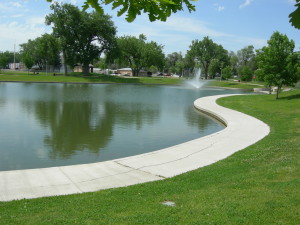Have you ever waited in line and put up with people who cut in front of you? Annoying, isn’t it?
What if the line was an opportunity to queue up and make the case for your favorite sport, or most creative idea, or a chance to do something for the entire community? And someone cut in ahead. And foreclosed not just your opportunity, but the chance for everyone else in line with you. This is what has happened to Rapid City’s Vision Fund and we are going to ask city candidates at our public forum what they think about that.
In 1992, 20 years after the 1972 flood reshaped the entire city, leaders looking to the future created the Rapid City Economic Development and Civic Improvement Fund, more commonly known as the Vision 2012 Fund, or now simply the Vision Fund. Citizens voted to extend the half-cent sales tax to provide a source of money for projects that would improve the quality of life in Rapid City.
The Vision Fund has served as a source of investment in municipal infrastructure, civic improvement, and economic development projects. Since its beginning, the Vision Fund has provided the city the wherewithal for activities as fundamental as wastewater treatment and airport expansion, as beneficial to our bodies as soccer, softball and baseball fields, ice rinks and swimming pools, as generous to our hearts and minds as hospice, senior centers, the arts and our library. It has also been a source for continued restoration, preservation, and beautification of our natural environment and park system.
The process occurs every five years, tapping extensive public participation to initiate, debate and nominate projects, which are then considered by the city council, sitting as a whole as the Vision Fund Committee. Normally, the Vision Fund gives even the smallest of projects the same shot at securing city financing as multimillion-dollar organizations. In recent rounds, though, the process has been overtaken by last minute demands for single items that did not go through the public process, and are so large there is little left for small, community-initiated ideas. These big “emergencies” jumped the queue, and pushed aside many worthwhile, citizen-initiated ideas.
The most recent example was the $150 million proposal to rebuild the civic center. The public outcry was so loud, the city has slowed down the rush
to soak up the Vision Fund for the foreseeable future.
Past applicants for Vision Fund money say the process was fair and equitable, even if time consuming and detailed.
Like them, we don’t mind standing in line, making our case, even losing to a better idea. What we do mind is the end-run around a process that was designed as citizen-based, inclusive, and open.
What do the candidates for city council and mayor have to say about the Vision Fund process? What would they do to adhere to the original intent? Or would they change the process, and if so, how?
Come find out. 6:30 p.m. Thursday, May 30. The Journey Museum Theater.


4 Comments on “Let’s put some vision back into the Vision Fund process”
On the money precisely. I hope the mayoral candidates are alerted to your essay in advance, because a thoughtfully considered response has more “staying power” than an off-the-cuff “I agree with everything you say. Next question…”
Mayoral and city council candidates know the topic is on the agenda, and our website is available to them.
Excellent article. The Vision Fund projects – large and small – benefit our community, and the original concept of the Vision Fund should be followed.
Nice to hear from you, Rob!